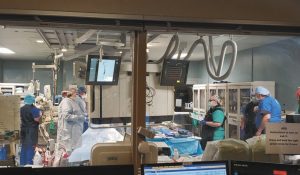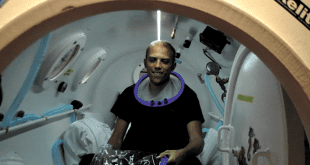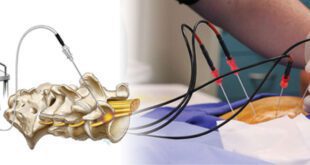 BayCare hospitals, including Morton Plant North Bay Hospital and St. Joseph’s Hospital-North, are performing TransCarotid Artery
BayCare hospitals, including Morton Plant North Bay Hospital and St. Joseph’s Hospital-North, are performing TransCarotid Artery
Revascularizations (TCAR), an innovative surgical procedure that is less invasive for patients with carotid artery disease. Carotid arteries are the blood vessels on the side of the neck. The disease happens when fatty, waxy buildups clog these arteries. The buildup can restrict blood flow to the brain.
Any repair of the carotid artery carries some stroke risk during the procedure itself. TCAR is specifically designed to help minimize stroke risk by keeping potential stroke particles away from the brain during the procedure.
“We are excited to be the first hospital in West Pasco County to bring this truly groundbreaking procedure to our patients and community,” said Brandon May, president of Morton Plant North Bay Hospital. “TCAR is a critical advancement in preventing future strokes. Used to treat carotid artery disease, TCAR may be an excellent, minimally invasive option for many.”
TCAR is considered an excellent alternative to the carotid endarterectomy, another type of carotid artery surgery.
“TCAR is not as high risk for stroke, it is a newer platform for major surgery,” said Alicia Allen, St. Joseph’s Hospital-North manager of interventional services.
Dr. Brandt Jones, a vascular surgeon, who performed the first several TCARs at St. Joseph’s Hospital-North points out other advantages in addition to a lesser chance of stroke.
“It can also prevent injury to nerves, complications related to post-surgical swelling and there is less of a risk for cardiovascular side effects,” Dr. Jones said. “The surgery is also more cosmetically appealing. The incision is significantly smaller and that can make a big difference for some people.”
In a TCAR, the surgeon makes a small incision at the neckline just above the collarbone. The surgeon places a sheath, a small tube, directly into the carotid artery and connects the sheath to an external flow reversal system that temporarily reduces the chance that stroke particles can infiltrate the brain.
Blood travels through a filter system outside the body and the filtered blood is returned to the body through a sheath in the femoral vein in the thigh. The surgical team implants a stent in the carotid to treat the narrowing of the artery. A stent is a tiny tube to open a blocked passageway.
TCAR can also reduce the time required to perform the procedure and the amount of time a patient needs to spend recovering in the hospital.
“TCAR is a new procedure but it’s a very important advancement in how carotid stenosis and carotid blockages are treated to try and prevent strokes or treat the aftermath of strokes,” said Dr. Mark Vaaler, chief medical officer of St. Joseph’s Hospital-North. “It is something we are excited to offer at St. Joseph’s Hospital-North so that our community members don’t have to travel to distant places to get this.”
In BayCare, five other hospitals along with St. Joseph’s Hospital-North in Lutz and Morton Plant North Bay Hospital in New Port Richey are currently performing TCAR: Mease Countryside Hospital in Safety Harbor, Morton Plant Hospital in Clearwater, St. Anthony’s Hospital in St. Petersburg, St. Joseph’s Hospital in Tampa and Winter Haven Hospital.
BAY CARE Learn more about TCAR:
https://baycare.org/services/heart-and-vascular/transcarotid-artery-revascularization-tcar
 Central Florida Health and Wellness Magazine Health and Wellness Articles of the Villages
Central Florida Health and Wellness Magazine Health and Wellness Articles of the Villages



